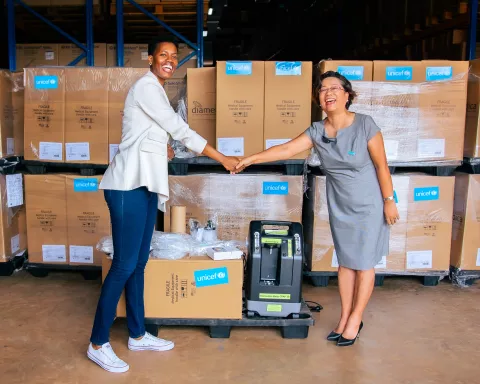A solution for tackling the challenge of malnutrition among pregnant women and children is here in Rwanda
Launch of a comprehensive Maternal Nutrition and Multiple Micronutrient Supplementation (MMS) Programme

Ngororero District, Rwanda, 17 January 2024 –, the Government of Rwanda, in collaboration with the Rwanda Biomedical Center (RBC) and UNICEF, launched the Multiple Micronutrient Supplementation (MMS) programme for pregnant women, to address the pressing issue of malnutrition as a key component of Antenatal Care (ANC) programme, in Kabaya health centre in Ngororero district. Despite remarkable progress, stunting is at 33 per cent in under-five years of children, anaemia among childbearing women is 13 per cent, anaemia among pregnant women is 25 per cent, Low birthweight is at 2.7 per cent, and neonatal mortality – the last mile challenge– remains at 17.5 per cent, and the maternal mortality rate of 203 per 100,000 births, remain major public health challenges.
Introducing MMS will break all the challenges including intergenerational cycle of malnutrition. Latest evidence indicates MMS can:
- Reduce the number of infants born with low birth weight by 12%,
- Reduce preterm births by 4- 8%,
- Reduce the number of small for gestational age newborn infants by 3 - 8%,
- Reduce the number of stillbirths by 5%, and
- Reduce the overall 6-month infant mortality by 7%
In resource-limited communities relying heavily on cereals, essential micronutrients such as iron, zinc, calcium, vitamin B12, and vitamin A are insufficient, affecting maternal and infant health. Recognizing the pivotal role of effective maternal nutrition in breaking the cycle of undernutrition, the Rwanda Ministry of Health, RBC, and UNICEF are collaboratively launching a comprehensive maternal nutrition programme including the MMS initiative.
Julianna Lindsey, UNICEF Rwanda Country Representative, expressed enthusiasm for UNICEF's involvement in the MMS launch, "UNICEF is delighted to join hands in this vital initiative dedicated to enhancing the health and nutrition of pregnant women, mothers, and children in Rwanda. Prioritizing robust maternal nutrition is pivotal in breaking the cycle of undernutrition and securing the lasting well-being of mothers and their children. Our commitment is to build a foundation where maternal and child health and nutrition flourishes, paving the way for a brighter future in Rwanda."
According to the Ministry of health Dr. Sabin Nsanzimana, this program will help accelerate the reduction of stunting among children, “Improving maternal nutrition and providing multiple micronutrient supplementation to pregnant women can help accelerate the reduction of stunting in children. This approach makes sense since a mother’s nutritional status during pregnancy can have a significant impact on the growth and development of her child. By ensuring that expectant mothers have access to a diverse range of nutrients, we can give children a better chance at reaching their full potential and leading healthy lives.”
The programme will be initiated in five districts, seeking to replace traditional iron-folic acid supplementation with Multiple Micronutrient Supplementation (MMS) for pregnant women, viewed as a game-changer in accelerating the reduction of stunting. MMS, containing 15 essential vitamins and minerals, including iron and folic acid, has shown superior effectiveness compared to iron and folic acid alone.
At the launch, the first dose of MMS will be administered to a pregnant woman. The programme's expected outcomes include improved maternal nutrition, reduced anemia, low birth weight, preterm births, small-for-gestational-age newborns, infant mortality, and stillbirths.
The Maternal Nutrition and MMS initiation Programme launch will emphasize the significance of maternal nutrition, MMS utilization, and early pregnancy care, aligning with the broader goal of stunting reduction interventions during the first 1000 days of a child's life.
Notes to editors:
About Rwanda Biomedical Centre
Rwanda Biomedical Centre (RBC) is the nation's central health implementation agency.
RBC was established in 2011 through a merger of fourteen key health institutions. RBC strives to improve the health of the Rwandan population by providing high quality, affordable and sustainable health care services. This is accomplished through the implementation of preventative, rehabilitative, and curative health interventions.
RBC conducts scientific research, provides diagnostics services, and implements innovative health interventions to protect the nation against diseases and other health threats.
Follow RBC on Twitter, Facebook and Flickr
For more information, please contact:
Mr Julien M. Niyingabira, Health Communications Division Manager, RBC Tel: +250 788 606 072, Julien.niyingabira@rbc.gov.rw
Media contacts
About UNICEF
UNICEF promotes the rights and well-being of every child, in everything we do. Together with our partners, we work in 190 countries and territories to translate that commitment into practical action, focusing special effort on reaching the most vulnerable and excluded children, to the benefit of all children, everywhere.
For more information about UNICEF and its work for children in Rwanda, visit www.unicef.org/rwanda.
Follow UNICEF Rwanda on Twitter, Facebook, Instagram and on our YouTube channel.




